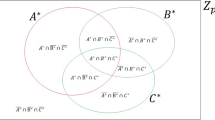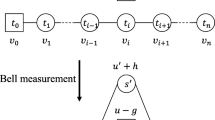Abstract
Private set computation (PSC) represents a pivotal technology in the information age, facilitating the processing of sensitive datasets while safeguarding privacy. In this paper, we propose a secure quantum protocol theoretically to achieve private set computation, utilizing the quantum entanglement correlations of Greenberger-Horne-Zeilinger (GHZ) states, and applicable to computations such as Private Set Intersection Cardinality (PSI-CA) and Private Set Union Cardinality (PSU-CA). This protocol incorporates an identity verification mechanism, ensuring that only authenticated users can engage in the computation process. It is designed to specifically cater to the computational requirements of PSI-CA or PSU-CA applications, while maintaining the privacy of each element within the data sets. Our approach utilizes tripartite GHZ states alongside single qubit preparations, which are notably straightforward to generate. Furthermore, the quantum operations required from users are confined to \(\mathcal {M}_X\) or \(\mathcal {M}_Y\) measurements, thereby enhancing the protocol’s practical feasibility. The proposed protocol is secure and can resist attacks from both internal and external attackers, such as user impersonation attacks, user collusion attacks, etc. To substantiate the practical applicability, we employ an example of two private data sets for experimental verification on the IBM quantum computing platform. This work further illustrates the advantages of the GHZ state in private set computing and explores the quantum benefits of entanglement in such computations.










Similar content being viewed by others
Data Availability
No datasets were generated or analysed during the current study.
References
Xu, G.-B., Wen, Q., Gao, F., Qin, S.-J.: Novel multiparty quantum key agreement protocol with ghz states. Quantum Inf. Process. 13(12), 2587–2594 (2014)
Deng, F.-G., Long, G.L., Liu, X.-S.: Two-step quantum direct communication protocol using the einstein-podolsky-rosen pair block. Phys. Rev. A 68(4), 042317 (2003)
Sutradhar, K., Om, H.: Efficient quantum secret sharing without a trusted player. Quantum Inf. Process. 19(2), 73 (2020)
Sutradhar, K., Om, H.: Enhanced (t, n) threshold d-level quantum secret sharing. Sci. Rep. 11(1), 17083 (2021)
Sutradhar, K., Om, H.: An efficient simulation of quantum secret sharing. ar**v preprint ar**v:2103.11206 (2021)
Wang, Q.-L., Sun, H.-X., Huang, W.: Multi-party quantum private comparison protocol with n-level entangled states. Quantum Inf. Process. 13(11), 2375–2389 (2014)
Li, X., Zhang, K., Zhang, L., Zhao, X.: A new quantum multiparty simultaneous identity authentication protocol with the classical third-party. Entropy 24(4), 483 (2022)
Sutradhar, K., Om, H.: A generalized quantum protocol for secure multiparty summation. IEEE Trans. Circuits Syst. II Express Briefs 67(12), 2978–2982 (2020)
Sutradhar, K., Om, H.: A cost-effective quantum protocol for secure multi-party multiplication. Quantum Inf. Process. 20, 1–10 (2021)
Shahid, F., Khan, A., Malik, S., Choo, K.K.R.: Wots-s: A quantum secure compact signature scheme for distributed ledger. Inf. Sci. 539, 229–249 (2020). https://doi.org/10.1016/j.ins.2020.05.024
Yadav, P., Mateus, P., Paunković, N., Souto, A.: Quantum contract signing with entangled pairs. Entropy 21(9), 821 (2019)
Wang, C., Deng, F.-G., Long, G.-L.: Multi-step quantum secure direct communication using multi-particle green-horne-zeilinger state. Optics Communications 253(1), 15–20 (2005). https://doi.org/10.1016/j.optcom.2005.04.048
Wang, Q.-L., Yu, C.-H., Li, Y.-C., Liu, J.-S., Shi, R.-H., Zhou, Y.: Authenticated quantum sortition and application in ”picking at random” problems. IEEE Commun. Lett. 25(2), 518–522 (2021). https://doi.org/10.1109/LCOMM.2020.3025319
Sutradhar, K.: A quantum cryptographic protocol for secure vehicular communication. IEEE Trans. Intell. Transp. Syst. (2023)
Venkatesh, R., Savadatti Hanumantha, B.: Electronic medical records protection framework based on quantum blockchain for multiple hospitals. Multimed. Tool Appl. pp 1–14 (2023)
Sutradhar, K., Venkatesh, R., Venkatesh, P.: In: Donta, P.K., Hazra, A., Lovén, L. (eds.) Quantum Internet of Things for Smart Healthcare, pp. 261–285. Springer, Cham (2024). https://doi.org/10.1007/978-3-031-50514-0_12
De Cristofaro, E., Kim, J., Tsudik, G.: Linear-complexity private set intersection protocols secure in malicious model. In: International conference on the theory and application of cryptology and information security, Springer, pp 213–231 (2010)
Chen, H., Laine, K., Rindal, P.: Fast private set intersection from homomorphic encryption. In: Proceedings of the 2017 ACM SIGSAC conference on computer and communications security, pp 1243–1255 (2017)
Dong, C.-Y., Loukides, G.: Approximating private set union/intersection cardinality with logarithmic complexity. IEEE Trans. Inf. Forensics Secur. 12(11), 2792–2806 (2017)
Raussendorf, R., Briegel, H.J.: A one-way quantum computer. Phys. Rev. Lett. 86(22), 5188 (2001)
Bourassa, J.E., Alexander, R.N., Vasmer, M., Patil, A., Tzitrin, I., Matsuura, T., Su, D., Baragiola, B.Q., Guha, S., Dauphinais, G., et al.: Blueprint for a scalable photonic fault-tolerant quantum computer. Quantum 5, 392 (2021)
Shi, R.-H., Mu, Y., Zhong, H., Zhang, S., Cui, J.: Quantum private set intersection cardinality and its application to anonymous authentication. Inf. Sci. 370, 147–158 (2016)
Debnath, S., Dey, K., Kundu, N., Choudhury, T.: Feasible private set intersection in quantum domain. Quantum Inf. Process. 20(1), 1–11 (2021)
Liu, B., Ruan, O., Shi, R., Zhang, M.: Quantum private set intersection cardinality based on bloom filter. Sci. Rep. 11(1), 17332 (2021)
Song, Y., Wu, Y., Wu, S., Li, D., Wen, Q., Qin, S., Gao, F.: A quantum federated learning framework for classical clients. Science China Physics, Mechanics & Astronomy 67(5), 250311 (2024)
Sutradhar, K.: Secure multiparty quantum aggregating protocol. Quantum Inf. Comput. 23(3 &4), 245–256 (2023)
Sutradhar, K., Venkatesh, R.: A privacy preserving quantum aggregating technique. Quantum Inf. Process. 23(4), 124 (2024)
Venkatesh, R., Hanumantha, B.S.: A privacy-preserving quantum blockchain technique for electronic medical records. IEEE Eng. Manag. Rev. (2023)
Shi, R.-H., Li, Y.-F.: Quantum private set intersection cardinality protocol with application to privacy-preserving condition query. IEEE Trans. Circuits Syst. I Regul. Pap. 69(6), 2399–2411 (2022)
Liu, W., Li, Y., Wang, Z., Li, Y.: A new quantum private protocol for set intersection cardinality based on a quantum homomorphic encryption scheme for toffoli gate. Entropy 25(3), 516 (2023)
Zhang, C., Long, Y.-X., Sun, Z.-W., Li, Q., Huang, Q.: Three-party quantum private computation of cardinalities of set intersection and union based on ghz states. Sci. Rep. 10(1), 1–10 (2020)
Li, Z., Jiang, X., Liu, L.: Multi-party quantum secret sharing based on ghz state. Entropy 24(10), 1433 (2022)
Wang, Q.-L., Yu, C.-H., Gao, F., Qi, H.-Y., Wen, Q.-Y.: Self-tallying quantum anonymous voting. Phys. Rev. A 94, 022333 (2016). https://doi.org/10.1103/PhysRevA.94.022333
Wang, J., Xu, G.-B., Jiang, D.-H.: Quantum voting scheme with greenberger-horne-zeilinger states. Int. J. Theor. Phys. 59, 2599–2605 (2020)
Xu, Y., Li, Z., Wang, C., Zhu, H.: Quantum sealed-bid auction protocol for simultaneous ascending auction with ghz states. Quantum Inf. Process. 20, 1–14 (2021)
Wang, Y., Hu, P., Xu, Q.: Quantum protocols for private set intersection cardinality and union cardinality based on entanglement swap**. Int. J. Theor. Phys. 60, 3514–3528 (2021)
Long, Z., Weijian, W., Kejia, Z.: Semi-quantum protocol for cardinalities of private set intersection and union based on ghz states. The Journal of China Universities of Posts and Telecommunications 29(4), 69 (2022)
Loukopoulos, K., Browne, D.E.: Secure multiparty computation with a dishonest majority via quantum means. Phys. Rev. A 81(6), 062336 (2010)
Eltschka, C., Siewert, J.: Entanglement of three-qubit greenberger-horne-zeilinger-symmetric states. Phys. Rev. Lett. 108, 020502 (2012). https://doi.org/10.1103/PhysRevLett.108.020502
Liu, B., Gao, Z.-F., **ao, D., Huang, W., Liu, X.-B., Xu, B.-J.: Quantum identity authentication in the orthogonal-state-encoding qkd system. Quantum Inf. Process. 18(5), 1–16 (2019)
Bennett, C.H., Brassard, G.: Quantum cryptography: Public key distribution and coin tossing. ar**v preprint ar**v:2003.06557 (2020)
Wang, Q.-L., Li, Y., Yu, C.-H., He, H., Zhang, K.-J.: Quantum anonymous ranking and selection with verifiability. Quantum Inf. Process. 19(5), 1–19 (2020)
Wang, R.-Q., Yin, Z.-Q., **, X.-H., Wang, R., Wang, S., Chen, W., Guo, G.-C., Han, Z.-F.: Finite-key analysis for quantum key distribution with discrete-phase randomization. Entropy 25(2), 258 (2023)
Gao, F., Song, L., Wen, Q.-Y., Zhu, F.-C.: A special eavesdrop** on one-sender versus n-receiver qsdc protocol. Chin. Phys. Lett. 25(5), 1561 (2008)
Joy, D., Surendran, S.P., Sabir, M.: Efficient deterministic secure quantum communication protocols using multipartite entangled states. Quantum Inf. Process. 16(6), 157 (2017)
Sutradhar, K., Om, H.: Hybrid quantum protocols for secure multiparty summation and multiplication. Sci. Rep. 10(1), 9097 (2020)
Sutradhar, K., Om, H.: An efficient simulation for quantum secure multiparty computation. Sci. Rep. 11(1), 2206 (2021)
Sutradhar, K., Om, H.: Secret sharing based multiparty quantum computation for multiplication. Int. J. Theor. Phys. 60(9), 3417–3425 (2021)
Gao, F., Qin, S.-J., Wen, Q.-Y., Zhu, F.-C.: A simple participant attack on the brádler-dušek protocol. Quantum information & computation 7(4), 329–334 (2007)
Wilde, M.: From classical to quantum shannon theory. ar**v preprint ar**v:1106.1445 (2011)
Ibm quantum experience. https://www.research.ibm.com/ibm-q/
Acknowledgements
We would like to thank the anonymous referees for their helpful comments. This research was supported by Key Lab of Information Network Security, Ministry of Public Security (C21605).
Author information
Authors and Affiliations
Contributions
Songyang Wu, Wenqi Sun, and Qingle Wang wrote the main manuscript text. Songyang Wu and Qingle Wang designed the quantum private set computation protocol. Yingying Wang and Jiawei Liu performed the experiment and prepared figures 1-10. All authors reviewed the manuscript.
Corresponding author
Ethics declarations
Competing interests
The authors declare no competing interests.
Conflict of interest
There are no Conflicts of Interest or Competing.
Additional information
Publisher's Note
Springer Nature remains neutral with regard to jurisdictional claims in published maps and institutional affiliations.
Rights and permissions
Springer Nature or its licensor (e.g. a society or other partner) holds exclusive rights to this article under a publishing agreement with the author(s) or other rightsholder(s); author self-archiving of the accepted manuscript version of this article is solely governed by the terms of such publishing agreement and applicable law.
About this article
Cite this article
Wu, S., Sun, W., Wang, Y. et al. A Secure Quantum Private Set Computation Protocol with Identity Authentication Utilizing GHZ States. Int J Theor Phys 63, 135 (2024). https://doi.org/10.1007/s10773-024-05672-1
Received:
Accepted:
Published:
DOI: https://doi.org/10.1007/s10773-024-05672-1




